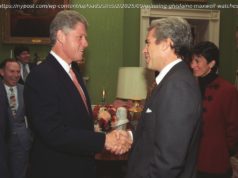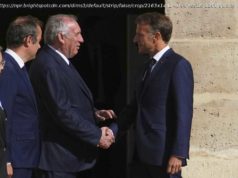The last time a British royal wanted to marry an American divorcee was in 1936 when King Edward VIII gave up the throne to marry Wallis Simpson.
LONDON — A British royal marrying an American divorcee in 1936 threw the British monarchy and the Church of England into crisis, but that didn’t happen when Prince Harry decided to marry Meghan Markle.
The announcement in London on Monday that Prince Harry is engaged to the American actress ended fevered speculation about the couple and was accompanied by statements of delight from Harry’s grandmother, Queen Elizabeth II, and his father, heir to the throne Prince Charles.
It was so very different from the last time a British royal wanted to marry an American divorcee. That 1936 engagement led to the abdication of the king, Edward VIII, who decided he would rather give up the throne than divorced Baltimore socialite Wallis Simpson.
The sticking point in 1936 was the rule on divorce and remarriage in the Church of England, of which the monarch of the United Kingdom is head. The church’s ban on remarriage for a divorced person whose previous spouse is alive applied to King Edward, and still held for Queen Elizabeth’s sister, Princess Margaret, in 1953. She was told she could not marry the man she loved, Capt. Peter Townsend, because the Church of England would not countenance it.
Her only path to marry him would be to renounce her right to the throne — and to effectively leave the royal family. She chose to not marry the Royal Air Force officer.
In 2005, the situation was different for the divorced Prince Charles, who wanted to marry the divorced Camilla Parker Bowles. He was free to remarry as a divorced man, because his first wife, Princess Diana, had died. But Parker Bowles’ first husband was still alive. The prince married Parker Bowles in a compromise: They tied the knot in a civil ceremony and then had an Anglican blessing for their marriage in St. George’s Chapel, at Windsor Castle, conducted by then-Archbishop of Canterbury Rowan Williams.
By then the Church of England had agreed that in certain circumstances those divorced could marry in church, but not if the relationship of the couple wishing to marry had caused the divorce, or if the latest wedding could cause public scandal. On those grounds, the church felt it was inadvisable for Prince Charles and Parker Bowles to have a full church wedding.
Today, Archbishop of Canterbury Justin Welby revealed no qualms about Prince Harry marrying a divorcee, a sign of how the Church of England has changed. “I wish them many years of love, happiness and fulfillment and ask that God blesses them throughout their married life together,” said the archbishop.
He also said, suggesting that the couple have already settled on an Anglican wedding ceremony: “I am so happy that Prince Harry and Ms. Markle have chosen to make their vows before God.”
It would have been a lot tougher for Prince Harry and Markle had she turned out to be Catholic. There has been speculation that Markle is Roman Catholic because she was educated at Immaculate Heart, an exclusive Los Angeles Catholic school. But press reports indicate that her parents chose it for its strong academics, rather than its religious character.
If Markle had indeed been Catholic she would have been unable, as a divorced woman, to marry in her own church unless it had declared her previous marriage invalid.
And until just four years ago, being Catholic would also have prevented her marrying into the British royal family, unless the person she intended to marry renounced his right to be in the line of succession.
It was only in 2013 that the Succession to the Crown Act was passed, enabling a Catholic to marry someone in line to the throne. What that act did not change was the requirement that the British sovereign be a Protestant.
But Britain’s religious heritage — its roots in the break with Rome enacted by Henry VIII — still resonates in royal affairs today. Given that the British monarch is also by law the head of the Church of England, any further reform is unlikely, unless the monarch’s role as head of the church is abolished.






